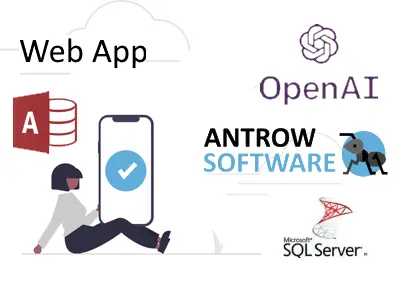Latest News
 Saturday, January 25, 2025
Saturday, January 25, 2025Revolutionizing MS-Access Migrations with AI
At Antrow Software, we’ve embraced the power of ChatGPT and Microsoft Copilot to bring faster, smarter, and more cost-effective solutions for migrating MS-Access databases to Web Apps and cloud platforms.
Here’s how AI is transforming the migration process:
- Lower Costs: Automation has significantly reduced development time, saving you money.
- Faster Results: Complex migrations are now completed in record time, minimizing delays.
- Improved Quality: AI ensures optimized, error-free solutions tailored to your unique needs.
- Focus on You: With smarter tools handling technical tasks, we can deliver a Web App that fits your business perfectly.
What’s in it for You?
By combining AI with our expertise, we’ve made it easier and more affordable to move your MS-Access databases to the cloud or Web App platforms like AWS or Azure. The result? Seamless access to your data and applications from anywhere, on any device.
In 2025, we look forward to continuing to provide innovative solutions to keep your business ahead.
Contact us today to learn how we can help you modernize your applications.
Visit antrow.com
Tags:
#MSAccess #DatabaseMigration #WebApp #CloudSolutions #ChatGPT #MicrosoftCopilot #AntrowSoftware #Innovatio

Customer stories
 Sunday, March 19, 2023Author: Antrow Software
Sunday, March 19, 2023Author: Antrow SoftwareWUUPPTI Corporation is a manufacturing company that had been using a Microsoft Access database for many years to manage their production data. However, they realized that the Access database was becoming outdated and not meeting their current business needs. They needed a modern solution that could handle their growing data and provide better functionality.
After doing some research, they came across Antrow Software, a company that specializes in converting Microsoft Access databases to web applications. WUUPPTI Corporation was initially hesitant about migrating their Access database, as they had heard horror stories about lost data and functionality during the conversion process. However, they were pleasantly surprised by Antrow Software's approach.
Antrow Software worked closely with WUUPPTI Corporation to understand their specific needs and requirements. They then created a customized web application that not only replicated all the features of their Access database, but also included additional functionality that was not available in the original database.
The migration process was seamless, and Antrow Software completed the project in a timely manner. The best part was that the cost was only two-thirds of what other competitors were offering for similar services. WUUPPTI Corporation was thrilled with the results and the cost savings, and they have been using the web application with full functionality like a Windows application ever since.
Overall, WUUPPTI Corporation was impressed with Antrow Software's professionalism, expertise, and commitment to delivering a high-quality product at an affordable price. They highly recommend Antrow Software to any business looking to migrate their Access database to a web application.

Latest articles
 Wednesday, May 3, 2023Author: Antrow Software
Wednesday, May 3, 2023Author: Antrow SoftwareMicrosoft Access has been used for data management and analysis for over 30 years. With the rise of remote work and online-based applications, MS-Access databases are being migrated to the web. This article introduces MS-Access web migration's benefits, problems, and considerations.
Web-based MS-Access improves accessibility, scalability, and collaboration. MS-Access web apps allow remote work and collaboration. Web-based apps can also grow with data and users. Scalability is essential for growing companies with changing data needs.
MS-Access online migration might also be difficult. Technical, security, and user adoption issues can arise. Compatibility difficulties and site development expertise might cause technical concerns. Compliance with regulations and data security are security considerations. Users may struggle to accept a new interface or workflow.
Moving MS-Access to the web requires various considerations. These include data needs, development team technical skills, and regulatory requirements. Web-based applications must be scalable and accessible.
Finally, transferring MS-Access to the web can improve accessibility, scalability, and collaboration. It also has technological, security, and user acceptance issues. Before migrating, firms must assess their data demands, technological skills, and legal obligations.